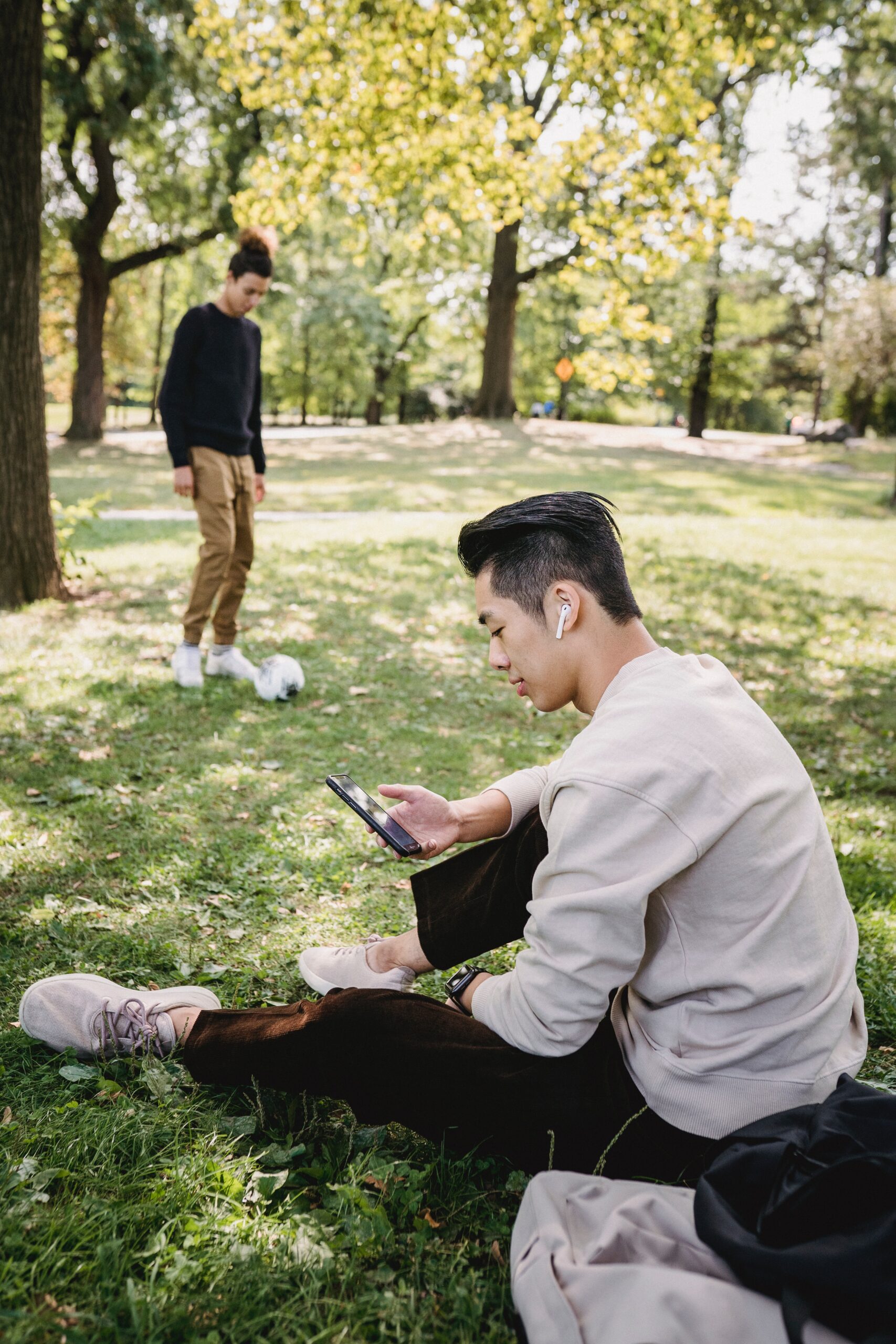Given my subtitle, you might be thinking that I’m a Luddite or some crackpot Chicken Little (“The Skype is falling!!”). But I’m not some anti-tech kook (really, I’m not). But over the years, I have assumed the role of a modern-day Paul Revere (“The techies are coming!”), wanting to alert people to the real harm that the last 20+ years of technological development is having on us personally and societally.
I felt compelled to write this article because the presence of earbuds seems to now be the rule rather than the exception when I’m out in the world. When I see kids walking home from school, the majority are wearing earbuds. When I take a walk with my dog in our neighborhood or go for a run along our local bike path, most adults also have those little white (let’s face it, almost all are Apple Airpods) plastic pieces in their ears. When students are studying and workers are working, they are mostly likely wearing earbuds.
You may be wondering how something as small and ubiquitous as earbuds can be a danger to ourselves and a threat to civilized society? I’m not talking about what earbud users (headphone users too) listen to either. Sure, there is a lot of unhealthy music (e.g., misogynistic, racist) and toxic podcasts (e.g., antagonistic, inciting) that can poison our psyches and harm our society. But, as Marshall McCluhan, the mid-20th-centry visionary, suggested, “The medium is the message.” What he means by this somewhat cryptic adage is that, though content certainly influences us in powerful and usually overt ways, the means through which that content is conveyed can be equally, and more insidiously, impactful on us individually and collectively.
The simple act of wearing earbuds and listening to whatever you listen to (the content doesn’t matter) is causing potentially irreparable damage to ourselves psychologically, emotionally, and socially.
Perhaps the most concerning aspect of the constant use of earbuds is the purgatory in which our minds reside. We are caught in a limbo between being connected with the outside world through some sort of social interaction and being connected with our internal world of thoughts and emotions.
This limbo also prevents us from fully experiencing our psychological and emotional world. By being focused on what we are listening to, we are distracting ourselves from our own thoughts and emotions. In other words, earbuds prevent us from being mindful of our internal experiences. Fully experiencing our inner lives is vital to knowing and understanding ourselves and acting in ways that nurture our mental health and well-being. With earbuds firmly inserted in our ears, we can’t readily tell if we’re feeling happy, sad, excited, angry, content, frustrated, or in love because we’re less likely to notice or think about our emotions. In not feeling the full spectrum of emotions, we are missing out what makes life meaningful and fulfilling, what makes us feel alive. For some, earbuds are a form of self-protection against a world that they deem as hostile or as self-medication that keeps them from feeling whatever pain they are trying to anesthetize themselves from.
Another subtly corrosive aspect of constantly being entertained by earbuds is that people are losing their ability to be bored. Now you might think that’s a good thing because boredom is, well, boring. But boredom is actually a vital evolutionary function that encourages out-of-the box thinking, spurs creativity, and catalyzes exploration. When we are bored, we are motivated to seek novel experiences, get out of comfort zones, and try new things. With continuous stimulation generated from earbuds, the mind becomes fixed on the content which prevents our minds from wandering and daydreaming. It is these moments of nonlinear thinking that give birth to new ideas, innovations, and discoveries.
Social connection is vital to our health and happiness, and earbuds prevent those essential connections from occurring. Because our attention is stuck in that neither-here-nor-there region of listening to content, we are less likely to even notice others because our focus is firmly planted in that limbo not quite inside and note quite outside our minds. And I’m sure you’ve experienced the situation of wanting to talk to someone, but don’t because you don’t want to disturb them. When you are wearing earbuds, you are also sending a signal to others around you that you don’t want to be disturbed. And think about those spontaneous moments in your life when you met someone who became important to you (or you haven’t had those moments because you’re always plugged in). They happened because you were open to the world around you. With earbuds, you are creating a virtual wall that surrounds you and that doesn’t readily allow others into your world.
It reminds me of a powerful YouTube video from eight years ago titled “Look Up,” which illustrates in a very unsettling way how a life can take two very different paths depending on whether you look up to see an opportunity that presents itself or don’t see it because you are looking at your phone (or, in this case, absorbed in your earbuds).
This aurally induced disconnection also has broad implications beyond ourselves and immediate world. We as families, community, society, and country are no longer applying the glue that keeps us united and that promotes communication, highlights our shared experience, and builds deep and lasting relationships. Admittedly, individual distancing will have no appreciable influence on our broader society, but multiple this habitual (and addictive) practice by billions and it’s not a stretch to see how it might contribute to the gradual unraveling of the ties that bind us.
I think we can all admit that, as I’ve described it, earbuds can be a real problem for us individually and collectively if used excessively. The really tough question to answer is: What do we do about it? The reality of our current economic and political landscape is that we are not likely to find solutions from our government or the free market. Ultimately, it is up to each of us to decide what we value, what our priorities are, and the kind of lives we want to live. The only real power we have to influence our own lives is our ability to make choices that we believe are healthy and life affirming. At the same time, we expand that power by exercising it with our families, friends, co-workers, and others in our lives and attempting to enlist them in this cause. By doing so, the power of one extends to the power of many. And that is how movements start and collective change can occur. So how about you start by taking your earbuds out of your ears and listen up?







